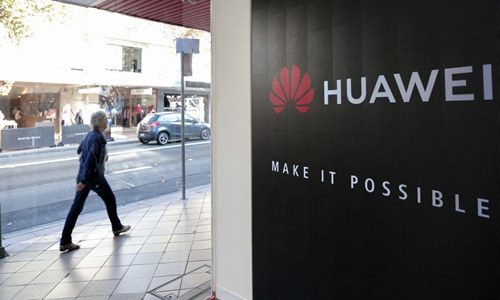Huawei’s HMS-powered P40 goes on sale globally
Source:Global Times Published: 2020/6/16 16:53:40

A pedestrian walks past a Huawei store in Sydney, Australia, May 23, 2019. Photo: Xinhua
Chinese technology giant Huawei has announced that sales of its latest P40 series, featuring its self-developed Huawei Mobile Services (HMS) rather the Google's GMS, have begun in Japan. The move will pose a challenge to the GMS-dominated market and expand Huawei's market overseas, according to experts.
The P40 Pro 5G, already on sale in Japan, is priced at 108,800 yen ($1,013). Huawei also announced that its P40 Pro+ smart phones will be on sale in Europe and the UK from June 25 at 1,399 euros ($1,585) and 1,299 pounds ($1,645).
The most prominent feature of the phone, apart from its hardware, is Huawei's self-developed HMS. As the US still bans its companies from buying or working with Huawei telecommunications equipment, the Chinese firm is prohibited from using the hugely popular services provided by Google, including the Google Play Store, Gmail or Google Maps on its phones.
Huawei has its own app store, App Gallery, where users can find and download various local and international apps. The P40 series is powered by the Kirin 990 5G chip developed by HiSilicon under Huawei.
Xiang Ligang, director-general of the Beijing-based Information Consumption Alliance, told the Global Times that the new services are "crucial" and could offer Huawei a big edge to expand its international market during an increasingly hostile crackdown in the US.
"Google's ban on providing services to Huawei is one of the biggest problems for its sales overseas," Xiang said. "Some of the most popular services and apps are currently provided by Google, and creating a brand new alternative ecosystem is not easy."
The Google Play Store currently hosts more than 271 million apps, according to a report by appinventiv.com, and around 3,730 new apps are added every day.
"Huawei's smartphones are top of the market when it comes to hardware, and if its self-developed services and system can be accepted by overseas customers that would be a huge step in creating a new ecosystem that is much less dependent on Google and the US," Xiang said.
RELATED ARTICLES:
- BYD to use Huawei chipsets amid increasing US crackdown: report
- US allows its firms to cooperate with Huawei on 5G standards due to company’s rising technological strength
- Canada, HSBC ‘accomplices’ of US in falsely accusing Huawei’s Meng Wanzhou: latest legal documents
- Shameful for Canada, UK to follow US on Huawei